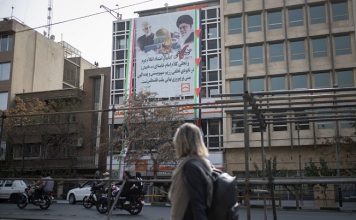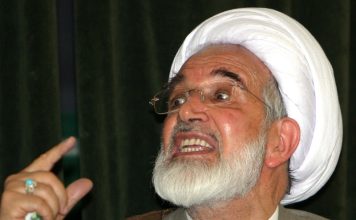A former Iranian police officer seeking asylum in the UK said his life would be at risk if he was sent to Rwanda under a controversial deportation plan unveiled in April by the British government.
The Rwanda asylum plan targets refugees crossing the English Channel to Britain by sending them to Rwanda to apply for asylum there.
“I’d be walking to my death. I’ll either be assassinated in Rwanda or the Islamic Republic [of Iran] will put so much pressure on the Rwandan government to deport me that I’ll be taken back to Iran. I’ll be facing death either way,” the former commander said in an interview with Kayhan Life.
[aesop_image img=”https://kayhanlife.com/wp-content/uploads/2022/06/2022-06-13T182603Z_1000567795_RC26RU97C1MJ_RTRMADP_3_BRITAIN-IMMIGRATION-RWANDA-scaled.jpg” panorama=”off” credit=”Protestors demonstrate outside the Home Office against the British Governments plans to deport asylum seekers to Rwanda, in London, Britain, June 13, 2022. ” align=”center” lightbox=”on” captionsrc=”custom” caption=”REUTERS/Henry Nicholls” captionposition=”left” revealfx=”off” overlay_revealfx=”off”]
The man — who cannot be named for security reasons — fled to the UK after refusing to follow orders by senior officials to fire at unarmed protestors in Iran during the 2019 anti-government demonstrations.
He testified against the Iranian government in November 2021 at the Aban tribunal in London: hearings launched by UK-based human rights groups investigating the deaths of hundreds of protestors in 2019.
Iran Accused of “Crimes Against Humanity” at Aban Tribunal in London
The man — who was designated for deportation under the scheme and scheduled to exit the UK on the first flight to Rwanda on June 14 — raised a legal challenge in the British courts to stop being deported. He has been allowed to remain in the UK pending the outcome of his case.
“The [UK] Home Office has clearly stated that they are not giving up the option to deport him, but now they will consider his case before doing anything,” said Hamid Sabi, a London-based human rights lawyer who served at the Aban Tribunal, China Tribunal and on-going Uyghur Tribunal, and who is familiar with the case.
IRGC Officer Tells Tribunal of Khamenei’s Alleged Role in Suppressing 2019 Protests
The flight itself was cancelled after a last-minute injunction was issued by the European Court of Human Rights (ECHR). The ECHR has told the UK that a formal trial must be held in London to decide whether the scheme is lawful before any more flights can take place.
Three other Iranian refugees were selected for deportation and asked to board the June 14 flight to Rwanda before it was grounded. One man is a 32-year-old Iranian-Kurd who worked with a Kurdish opposition group.The second man is a 25-year-old Iranian-Kurd and the third individual is a 55-year-old male.
The British government has offered little information about what the refugees can expect when they land in Rwanda. A June 1 press release published by the Home Office said refugees would be eligible for up to five years of training, as well as accommodation and healthcare on arrival. The UK has invested an initial sum of $145 million into Rwanda’s economic development as part of the asylum agreement between the countries.
The plan has already been called unlawful by the United Nations High Commissioner for Refugees (UNHCR), the UN’s refugee agency. Several Home Office officials said the scheme was racist in a closed April 21 meeting, according to a report by The Times of London.
“I see this as a government which plays to a misapprehension that somehow if you look or sound different to white British, you’re likely to be more of a danger to the British way of life,” Wayne Jordash, an international human rights lawyer who served as a judge for the Aban tribunal, told Kayhan Life. “If you are going to focus in on exactly how asylum seekers got into the country, rather than focusing on whether they’re coming from places where there’s a genuine risk of persecution, you end up discriminating against people of color. This is because people of color tend to come from countries where the way to get into the country is, according to this government, illegal.”
Speaking about safety concerns connected to the former police officer’s deportation, Jordash said:
“A police officer or a person who used to be part of the security services in Iran testifying against their orders, or the conduct of the security services objectively presents as having a real risk. If you get on the wrong side of the security services, there is an objective risk to your safety.”
SPECIAL REPORT- Iran’s Leader Ordered Crackdown on Unrest: “Do Whatever It Takes to End It”
A change.org petition to stop the former police officer’s deportation started by London-based non-governmental organization Justice for Iran (JFI) has gathered more than 62,000 signatures.
“The refugee convention obliges the states where asylum is sought, to assess the asylum claim of an individual fairly and thoroughly and determine whether their case falls within the definition of refugee or not. The UK Rwanda plan of offshoring its obligation to a third country creates a situation that is not foreseen by the convention,” Shadi Sadr, the executive director of JFI and a co-organizer of the Aban Tribunal told Kayhan Life.
“Therefore, it places the asylum seekers outside the protection of the convention and in a state of ‘lawlessness’. By forcing asylum seekers to go to Rwanda, the UK government also violates the fundamental rights of these individuals to decide where they seek asylum for themselves and strips them of their dignity,” Sadr added.
Despite the uncertainty surrounding his case, the former policeman is hopeful he won’t be deported.
“I’m very optimistic. I trust my lawyers and everyone who’s fighting for me to manage to keep me safe. And I want to thank everyone who’s stood up for me and supported me.”







